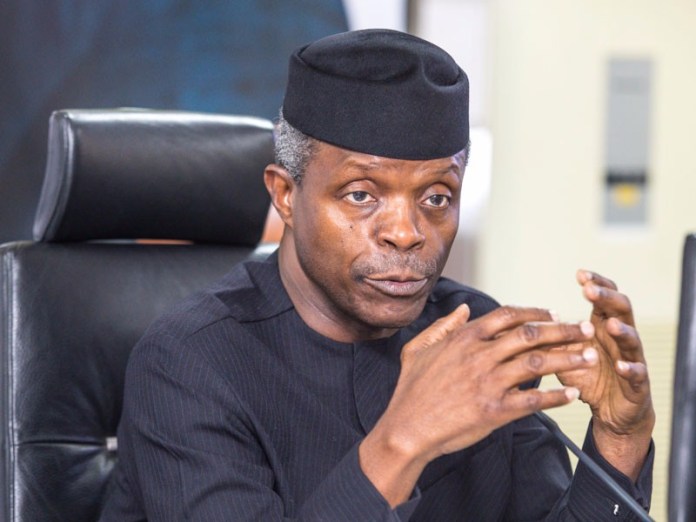- Nigeria’s Growth Will Be Technology Driven, Not Oil – Osinbajo
Nigerian Vice President, Prof. Yemi Osinbajo, said going forward national growth will mostly be driven by technology and not the oil and gas.
The Vice President disclosed this on Wednesday at the unveiling of PricewaterhouseCoopers’ Innovation Experience Centre in Lagos.
Osinbajo, who was represented by the Director-General of the Budget Office, Ben Akabueze, said the new centre is in line with the current administration agenda to improve ease of doing business, transform the economy and boost technology adoption.
“The PwC Experience Centre is in line with the smart technology initiative of the government. As an administration, we recognise that Nigeria’s future does not lie in oil and gas but more in technology and innovation. This is anchored on moving the economy away from a resource-based to a people-based model. We must take this seriously going forward,” Osinbajo said.
Other top guests at the centre were Lagos State Governor, Babajide Sanwo-Olu; the Chairman, Zenith Bank, Jim Ovia; and the Regional Senior Partner, PwC West Africa, Uyi Akpata.
Sanwo-Olu said the facility reflects the state’s plan to grow the city through smart solutions. He further said corporate organisations should take advantage of the government’s technology agenda to grow.
“I think the PwC initiative is the way to go. It is in line with what the Lagos State government is doing to boost the economy. I encourage other companies to see it as a challenge and begin to tap into the opportunities the government is creating,” he said.
Jim Ovia, who chaired the event, said businesses in Nigeria can triple their growth and earnings via innovation and technology.
“The options are to innovate and transform or die,” he said.
Akpata said PWC, through the centre, will expand its digital services and innovative solution to other West African nations.
He added, “The centre, the first of its kind by a professional services firm in West Africa combines creativity, research, existing knowledge and strategic insight with a new structured way of solving problems. This unique, modular, flexible concept supports PwC’s clients’ teams in exploring, designing and building user-centric solutions, ranging from re-imagining customer experiences to fully transforming business models and creating new ecosystems. The use of emerging technologies is pivotal to this designing process.”

 Forex2 weeks ago
Forex2 weeks ago


 Naira2 weeks ago
Naira2 weeks ago
 Billionaire Watch1 week ago
Billionaire Watch1 week ago




 Naira2 weeks ago
Naira2 weeks ago




 Naira1 week ago
Naira1 week ago




 Naira4 weeks ago
Naira4 weeks ago
 Nigerian Exchange Limited4 weeks ago
Nigerian Exchange Limited4 weeks ago


 Naira3 days ago
Naira3 days ago






















